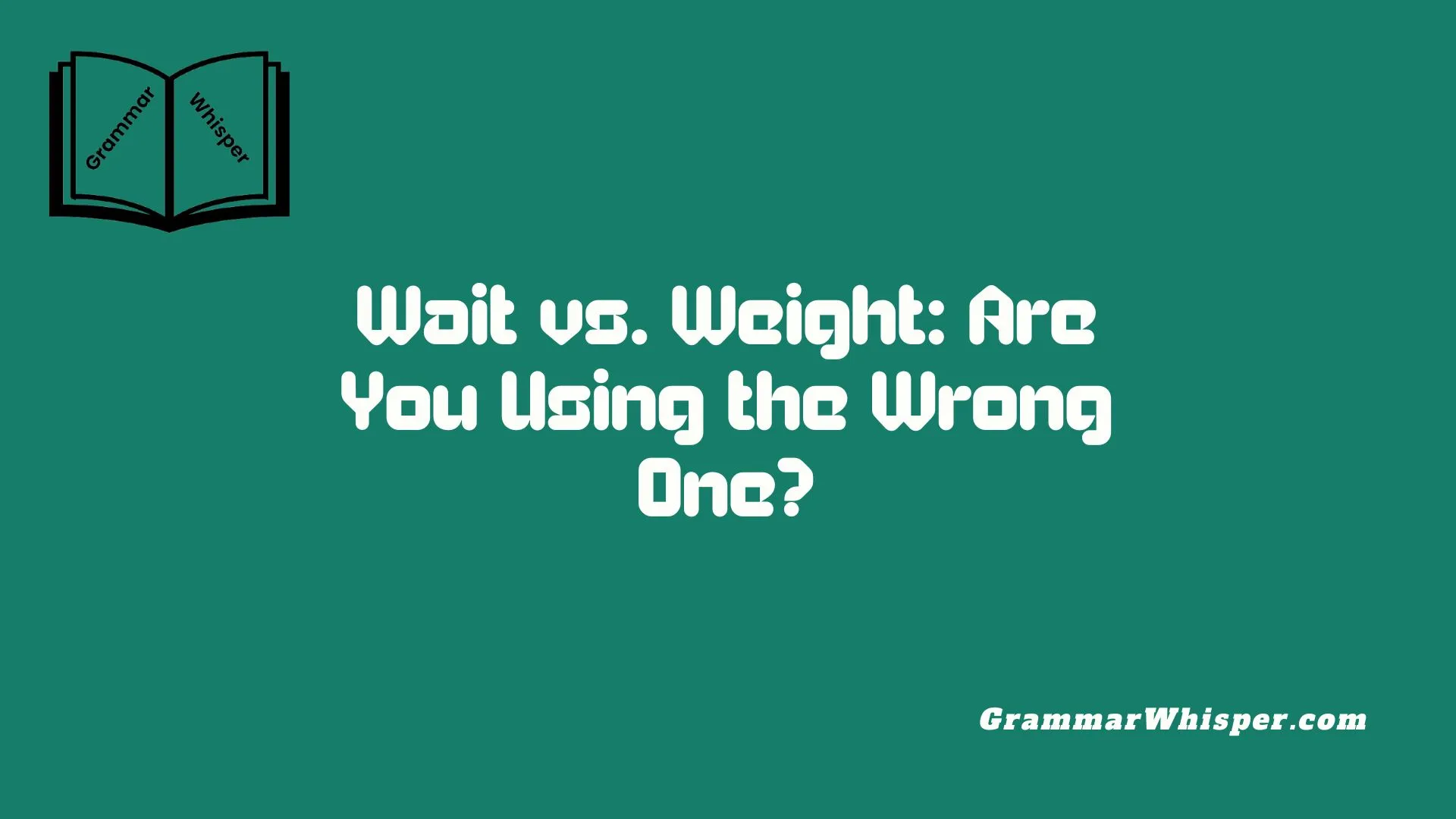The English language is full of hidden traps – tiny quirks that often confuse even advanced learners and fluent speakers. One of the biggest pitfalls is recognizing homophones – words that sound the same but mean something completely different. If you take a quick glance at “Wait vs. Weight,” or hear them spoken aloud, they’re nearly indistinguishable. That tiny detail has created loads of confusion, especially in writing. I once tutored an advanced ESL student who constantly used “weight” instead of “wait” in every essay. It was awkward, often funny, and at times even costly, like when he wrote “Can’t weight to meet you” in a job application.
This short guide helps clarify that very difference with real-life examples, precise definitions, and practical usage tips. These tools, when applied with ease, can help eliminate those sneaky mistakes once and for all. As someone who has worked with language learners for years, I can tell you just how tricky homophones really are – especially when the only clue lies in the surrounding context. Though “wait” and “weight” may sound the same, their functions in a sentence make all the difference.
Why ‘Wait’ vs. ‘Weight’ Confuses Even Fluent English Speakers
Even seasoned writers and native speakers sometimes mess up “wait” and “weight.” Why?
What Makes Homophones So Tricky?
Homophones share identical pronunciation but differ in spelling and meaning. That means your ears hear the same word, but your brain has to rely on context to figure out which is which. When you’re writing, that context isn’t always clear.
Quote: “English doesn’t borrow from other languages. It follows them down dark alleys, knocks them over, and goes through their pockets for loose grammar.” – James Nicoll
Real-life Situations Where the Confusion Happens
- Typing fast and auto-correct switches “weight” to “wait”
- ESL learners writing essays or exams
- Transcribing audio or interviews
- Creating social media captions or YouTube scripts
Why This Matters for ESL Learners, Writers, and Professionals
Mistaking these two words can undermine credibility, confuse your audience, or weaken your message. Mastering this difference is a quick win that improves your clarity and professionalism instantly.
Definition and Usage of ‘Wait’
Let’s start by exploring the word “wait.”
What Does ‘Wait’ Mean? (Verb & Noun Breakdown)
Wait can function as both a verb and a noun:
| Form | Meaning | Example |
| Verb | To stay in place or delay action until a particular time | “We will wait until she arrives.” |
| Noun | The act or period of waiting | “There was a long wait at the doctor’s office.” |
Synonyms: delay, pause, linger, remain
How to Use ‘Wait’ in Different Tenses
| Tense | Example |
| Present Simple | I wait every morning for the bus. |
| Present Continuous | She is waiting for a reply. |
| Past Simple | We waited for hours. |
| Present Perfect | They have waited too long. |
Idioms and Phrasal Verbs with ‘Wait’
Here are some common expressions:
- Wait up – Don’t go ahead without me
- Wait it out – Be patient until something ends
- Wait in line – Queue
- Can’t wait – Expressing excitement or eagerness
Example: “I can’t wait to see the new movie this weekend!”
Definition and Usage of ‘Weight’
Now, let’s unpack the word “weight.”
What Is ‘Weight’? (Noun Focus – Mass, Burden, Importance)
Weight is almost always used as a noun and refers to:
- Mass or heaviness of an object
- Emotional or psychological burden
Importance or seriousness of an issue
| Context | Meaning | Example |
| Physical | Heaviness or mass | “The bag is too heavy; it’s over the weight limit.” |
| Emotional | Pressure or burden | “He carried the weight of guilt.” |
| Abstract | Importance or influence | “His words carry weight in this community.” |
Everyday and Technical Uses of ‘Weight’ in Context
- Science: Measured in kilograms (kg) or pounds (lbs)
- Fitness: Weightlifting, body weight exercises
- Economics: Weighted average, weight in data analysis
- Language: Words that “carry weight” mean they matter
Idiomatic Expressions with ‘Weight’
- Pull your weight – Do your fair share of work
- Weight off your shoulders – Relief from a burden
- Throw your weight around – Use your authority in an aggressive way
Example: “After the confession, it felt like a weight off her shoulders.”
Deep Dive into Homophones: Why ‘Wait’ and ‘Weight’ Sound Identical
Phonetics Breakdown: IPA Transcription & Sound Patterns
Both words are pronounced: /weɪt/ Despite different spellings, they share the same vowel and consonant sounds:
- Initial sound: /w/
- Vowel sound: Long “a” /eɪ/
- Ending: /t/
That’s what makes them perfect homophones.
How English Developed So Many Homophones
- Loanwords from Old Norse, Latin, French
- Silent letters became standard
- Sound shifts over centuries caused overlap
Fact: English has over 400 homophones commonly used in writing and speech.
The Role of Silent Letters and Spelling History
- “Weight” comes from Middle English weyghte, which included silent gh due to earlier pronunciations.
- “Wait” has always meant to remain or delay from Old Northern French waitier.
Grammar Guide: When to Use ‘Wait’ vs. ‘Weight’
Sentence Structure Patterns to Watch
- “Wait” often follows a person or time expression
- “Weight” often precedes a measurement or object
Part of Speech Test (Verb vs. Noun Usage)
Try replacing the word with a synonym:
- If “pause” works → it’s “wait”
- If “heaviness” fits → it’s “weight”
Test Sentence: “The ____ of responsibility was too much.” ✅ Correct word: weight
Using Context Clues to Choose the Right Word
Look for these signals in the sentence:
| If you see… | Use… |
| Numbers, kg, lbs, heavy, lift | Weight |
| Time, delay, minutes, late | Wait |
| Phrases like “can’t ___” or “had to ___” | Wait |
| Emotional or symbolic meaning | Weight |
Common Errors and Real Fixes
Most Frequent Mistakes (Texting, Emails, Exams)
- “I can’t weight to see you!” ❌
- “The wait of the package was over 5 pounds.” ❌
Funny & Embarrassing Examples from Real Life
- Social media post: “Just wait for my gym progress – I’m losing weight!” Confused? So were the commenters!
Practice Sentences with Detailed Explanations
| Sentence | Correct Word | Why |
| Please ___ for me outside. | Wait | Action verb |
| The ___ of this couch is unbearable. | Weight | Physical heaviness |
| I’ll ___ until you’re ready. | Wait | Time-related |
| She’s lost a lot of ___ recently. | Weight | Body mass |
Origins: Where Did ‘Wait’ and ‘Weight’ Come From?
Old English Roots and Latin Influences
| Word | Origin |
| Wait | Old French waitier, meaning “to watch, guard” |
| Weight | Old English wiht, from Proto-Germanic wega (to carry) |
How the Words Evolved Separately
Even though they now sound identical, they evolved in completely separate branches of the language. Their convergence in sound was a linguistic accident, not intentional.
Why Spelling Drifted from Pronunciation
English spelling became standardized in print before pronunciation finished evolving, which is why we have weird spellings like “weight” with a silent gh.
How to Remember the Difference Easily
Simple Memory Tricks (Mnemonic Devices)
- Wait = Time → “I wait for time to pass.”
- Weight = Mass → “Weight includes ‘he’ – like he lifts weights.”
Visual Aids or Flashcards for Quick Recall
Create two flashcards:
- One with a clock or stopwatch = Wait
- One with a dumbbell or scale = Weight
Apps, Games, and Tools to Reinforce the Habit
- Duolingo – Homophone quizzes
- Quizlet – Custom flashcard decks
- Grammarly – Real-time writing corrections
Quick Reference Table: ‘Wait’ vs. ‘Weight’
| Feature | Wait | Weight |
| Part of Speech | Verb, Noun | Noun |
| Meaning | Delay, stay, pause | Heaviness, burden, importance |
| Pronunciation | /weɪt/ | /weɪt/ |
| Spelling Tip | Simple spelling | Includes silent “gh” |
| Example Sentence | Wait for me! | The weight is 70kg. |
Final Quiz: Can You Spot the Mistakes?
Test yourself with these sentences. Choose “wait” or “weight.”
- I can’t _____ to see the results.
- The _____ of this box is too much for one person.
- You’ll need to _____ in the lobby.
- She lost a lot of _____ after the marathon.
Answer Key:
- Wait
- Weight
- Wait
- Weight
Conclusion
The difference between wait and weight is more than spelling – it’s about meaning, clarity, and confidence.
If you:
- Understand the definitions
- Practice the usage in context
- Memorize simple cues
- Use real-life examples
FAQs
What is the main difference between “wait” and “weight”?
The main difference is in meaning and function. Wait is usually a verb meaning to pause or delay, while weight is a noun that refers to mass, heaviness, or importance. Even though they sound alike, they are used in totally different contexts.
Why do “wait” and “weight” sound the same if they’re different words?
They are homophones, meaning they have the same pronunciation but different meanings and spellings. This happens often in English because of the way words evolved from other languages like Latin, Old French, and Germanic roots.
How can I remember the difference between “wait” and “weight”?
Use this memory trick:
- Wait has to do with time – like waiting in line.
- Weight relates to mass or lifting – it even includes “he,” as in “he lifts weights.”
Can “weight” ever be a verb like “wait”?
Not in standard usage. Weight is overwhelmingly a noun, but there is a rare verb form (e.g., “to weight a ballot”), meaning to assign importance or mass. Wait, on the other hand, is regularly used as both a verb and a noun.
Is it wrong to say “I can’t weight to see you”?
Yes, that’s a common mistake. The correct sentence is “I can’t wait to see you.” Saying “weight” here changes the meaning entirely and makes the sentence confusing or incorrect. Always check the context to choose the right word.











